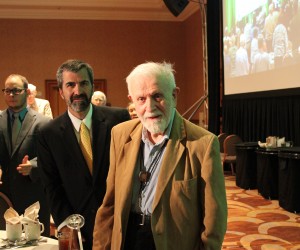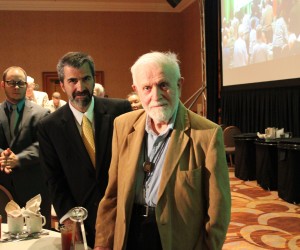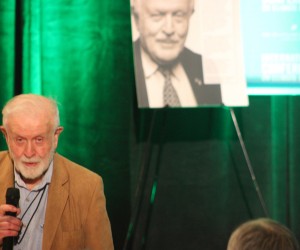2014 Winner of the Lifetime Achievement in Climate Science Award
Dr. S. Fred Singer was among the first and is still the most prominent scientist in the world speaking out against global warming alarmism. He is the author, coauthor, and editor of many books, including Climate Change Reconsidered (several volumes), a comprehensive critique of the assessment reports of the United Nations’ Intergovernmental Panel on Climate Change.
Dr. Singer, an atmospheric and space physicist, founded the Science and Environmental Policy Project (SEPP) and the Nongovernmental International Panel on Climate Change (NIPCC). He continues to serve as chairman of SEPP and as a member of the leadership team of NIPCC.
Dr. Singer has published more than 200 technical papers in peer-reviewed scientific journals, including Bulletin of the American Meteorological Society, Energy & Environment, EOS: Transactions of the AGU, Geophysical Research Letters, International Journal of Climatology, Journal of Meteorology and Atmospheric Physics, Nature, and Science. His editorial essays and articles have appeared in Cosmos, The Wall Street Journal, New York Times, New Republic, Newsweek, Journal of Commerce, Washington Times, Washington Post,and many other publications. His accomplishments have been featured in front-cover stories appearing in Time, Life, and U.S. News & World Report.
Dr. Singer is an elected Fellow of the American Association for the Advancement of Science (AAAS), American Geophysical Union, American Physical Society, and American Institute for Aeronautics and Astronautics. He was elected to the AAAS Council and served on the Committee on Council Affairs, and as Section Secretary. In 1997, NASA presented Dr. Singer with a commendation and cash award for important contributions to space research.” In 2014, Dr. Singer received the Climate Science Lifetime Achievement Award and a cash stipend from The Heartland Institute. The award was presented in Las Vegas at the Ninth International Conference on Climate Change on July 7-9.
Dr. Singer has given hundreds of lectures and seminars on global warming, including to the science faculties at Stanford University, University of California-Berkeley, California Institute of Technology, State University of New York-Stony Brook, University of South Florida-St. Petersburg, University of Connecticut, University of Colorado, Imperial College-London, Copenhagen University, University of Rome, and Tel Aviv University. He also has given invited seminars at Brookhaven National Laboratory, the Max Planck Institute for Extra-Terrestrial Physics in Munich, the Max Planck Institute for Meteorology in Hamburg, and the National Center for Atmospheric Research in Boulder, Colorado.
Dr. Singer has been a pioneer in many ways. At the Applied Physics Laboratory of Johns Hopkins University, he participated in the first experiments using high-altitude research rockets, measuring the energy spectrum of primary cosmic rays and the distribution of stratospheric ozone; he is generally credited with the discovery of the equatorial electrojet current flowing in the ionosphere. In academic science during the 1950s, he published the first studies on subatomic particles trapped in the Earth’s magnetic field: radiation belts, later discovered by James Van Allen. Dr. Singer was the first to make the correct calculations for using atomic clocks in orbit, contributing to the verification of Einstein’s General Theory of Relativity and now essential in the GPS system of satellite navigation. He also designed satellites and instrumentation for remote sensing of the atmosphere and received a White House Presidential Commendation for this work. In 1971, Dr. Singer calculated the anthropogenic contribution to atmospheric methane, an important greenhouse gas. He also predicted that methane, once reaching the stratosphere, would transform into water vapor, which could then deplete stratospheric ozone. A few years later, methane levels were indeed found to be rising, and the increase in stratospheric water vapor was confirmed in 1995. Dr. Singer serves on the editorial advisory board of Regulation.Read More



